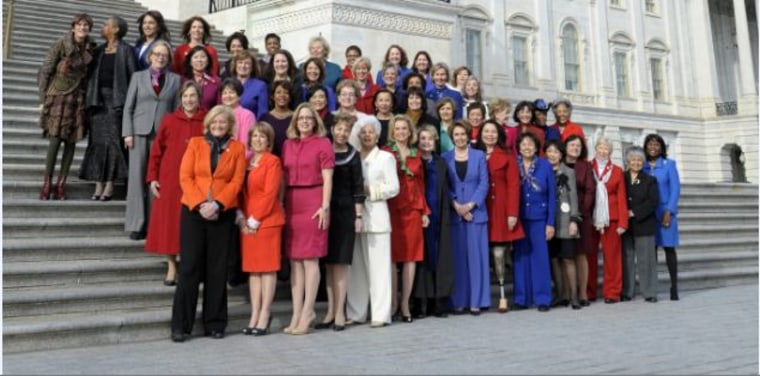Female politicians have been making headlines all over town, from Michele Bachmann announcing her retirement from Congress, to Alison Lundgren Grimes debating throwing her hat in the Kentucky Senate race to female lawmakers leading the discussions on gun control measures, immigration, and sexual assault in the military. Last Saturday on Melissa Harris-Perry, the panel discussed the importance of having women in elected office, and how more can be urged to run in the upcoming elections.
Women in government seem to come to the job with an agenda of productivity: their goals are not to quibble over ideological differences but to talk, listen and compromise in order to pass comprehensive legislation to protect women against violence and to promote women’s health, among many other issues. “That’s why we need more women in elected office because they are going to push these issues forward and raise the questions that quite frankly men have no raised,” said panelist Reshma Saujani, a Democratic candidate for New York City public advocate.
In a recent Vogue interview by Amanda Foreman, Nancy Pelosi stated, "women are very operational: They get the job done. They are consensus builders, too. They listen; they are editors; they weed out what isn’t necessary to get an impact.” As theGrio managing editor Joy Reid pointed out, when Pelosi was Speaker of the House more legislation was passed than the House that passed Medicare.
On the Senate side, Foreman quotes Senator Amy Klobuchar of Minnesota: "Women have proven to be problem solvers who work across the aisle to get things done." If there is anything our Congress needs now, it is members who will reach across that line, not at the expense of their principles, but to compromise in order to yield results. "We need all sorts of women because we are a full spectrum and so I don’t want to just see raging feminists [in Congress] I want to see women there who side with policies that I may not like because they are the voice of other female Americans," noted Carmen Wong Ulrich, industry professor of finance at NYU PolyTech.
Currently, though it is a historic number, only 98 out of the 535 members of Congress are female; five committee chairs in the Senate are women and five of the 15 elected leadership positions in the House belong to women. Only five out of 50 governorships belong to woman. If women are so successful when they are in office, why aren’t more in office? The answer is the campaign.
Many women find it overwhelming to run, they have a family to balance, face the daunting task of raising funds, and then have to go through the exhausting process of having their every move interpreted as too nice and therefore weak, or too pushy and therefore cold, polarizing, or mean. While men do face campaign struggles, they experience only a fraction of the public scrutiny that awaits female politicians.
If we are to see an influx of women in government, we need to see an influx in women running for office. Next year, in addition to the congressional elections, there will be 36 gubernatorial races. We need to encourage women to run by making running for and holding office a realistic accomplishment. In an interview with Politico, Gov. Maggie Hassan said, “…we all need to keep…reaching out to other women and let them understand that running for office can fit into their lives and that they can be good at it.” Most recently we have seen the effect of this encouragement with EMILY’s List’s endorsement of Allyson Schwartz in Pennsylvania’s race to unseat governor Tom Corbett.
Empowering women to run is the first step, but there are still institutional practices that need to be addressed. Pelosi notes in Foreman's article the fiscal constraints women face and rules that do not let them use their income to allow children to travel with them. With a fixed income there is also little flexibility for a member of Congress to maintain a DC residence and a family residence, unless they have funds elsewhere. And while it may seem like a small issue, even the practice of holding votes late in the evening could be reformed to allow mothers to get home and not have to rush back to the office. Admittedly, these changes make it seem like women in government should also be relegated to the stereotypical June Cleaver role, but the fact remains that most women are tasked with taking care of their families while men are free to stay late in the office and away from home.
Although the obstacles that women face seem overwhelming, they are also unifying. Women in government use their shared struggles to relate to one another and build bipartisan relationships. When interviewed by Foreman, Sen. Gillibrand said, “[o]ur presence and perspectives do a great benefit to the common good because they broaden the outlook on what the solutions are to the issues.” These women find ways to bond over their similarities in order to overcome their differences. “When it comes down to brass tacks, women are women and they’re going to defend themselves, defend their own honor,” said Reid.
We can change the collective apprehension of women holding higher office only by increasing the visibility of female politicians, and it all starts with the campaign. As we gear up for the 2014 election season, political consultants will be looking for people to run, and they will most certainly be looking for women. As Molly Ball writes in The Atlantic, "all else being equal, women make more desirable candidates." All we need to do now is show them they can do it.
In an NBC Nightly News interview on May 22, special correspondent Maria Shriver sat down with Sen. Gillibrand, Sen. Collins and Rep. Speier to talk about their proposed legislation to take the prosecution of sexual assault in the military, out of the chain of command. See that interview below.
